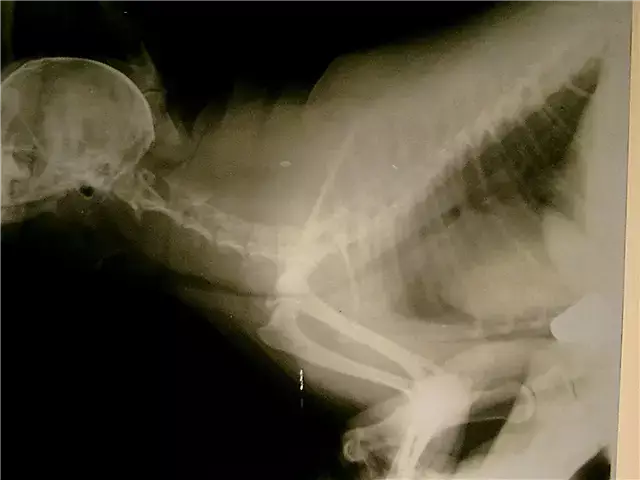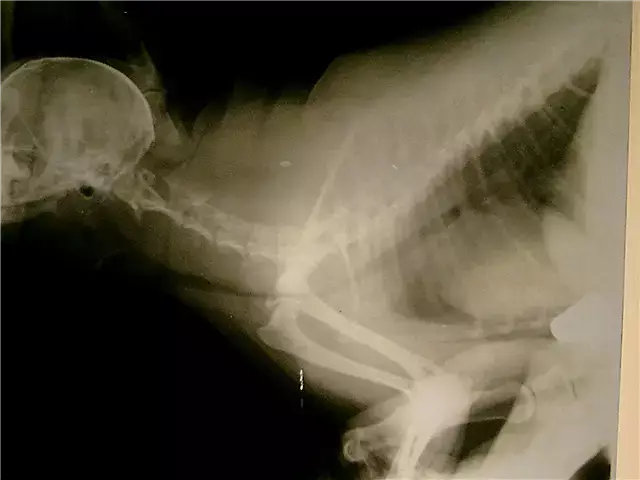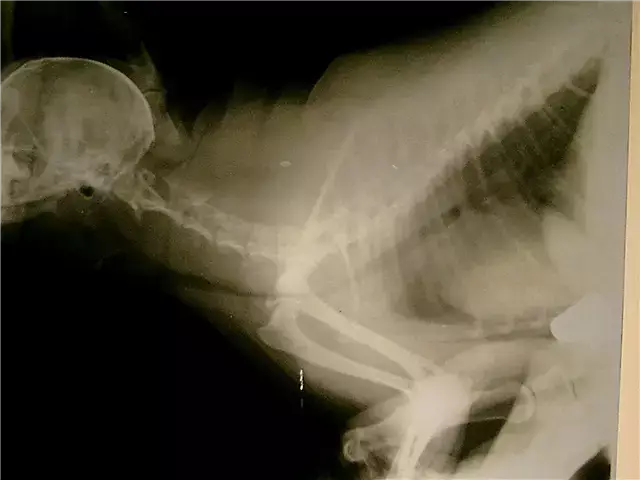- Author Rachel Wainwright wainwright@abchealthonline.com.
- Public 2023-12-15 07:39.
- Last modified 2025-11-02 20:14.
Calcitonin
Instructions for use:
- 1. Pharmacological action
- 2. Release form
- 3. Indications for use
- 4. Method of application
- 5. Side effects
- 6. Contraindications to use

Calcitonin is a drug used to treat the parathyroid glands.
Pharmacological action of Calcitonin
Calcitonin, a hormone produced by the thyroid gland, plays an important role in regulating the metabolism of phosphates and calcium in the body, reduces the release of calcium from bones, which is effective in conditions associated with a sharply increased rate of absorption of this element and the formation of bone tissue, such as breast nipple cancer, some forms of osteoporosis, malignant osteolysis.
Calcitonin reduces the activity of osteoclasts (cells that promote cartilage resorption) and increases the activity of osteoblasts (cells responsible for bone formation), and lowers the increased amount of calcium in the blood. Also, the drug enhances the excretion of sodium, calcium, phosphorus in the urine, reducing their reabsorption in the renal tubules. At the same time, the calcium content in blood serum does not fall below normal.
The hormone Calcitonin reduces the secretion of gastric juice, pancreatic enzymes, without affecting the mobility of the gastrointestinal tract.
Calcitonin has also been shown to have analgesic effects.
Release form
Calcitonin is produced in the form of a solution for injections, infusions, intranasal administration.
Indications for the use of Calcitonin
Calcitonin is prescribed for the treatment of systemic diseases, which are characterized by enhanced skeletal reconstruction: osteogenesis imperfecta, Paget's disease, spontaneous bone resorption, aseptic necrosis of the femoral heads, parathyroid osteoporosis, climacteric, steroidal, fibrous bone dysplasia, post-union lesions radiation, traumatic osteomyelitis, pathological remodeling of bones in athletes), periodontal disease.
To determine the need to prescribe the drug, tests are carried out to determine whether Calcitonin corresponds to the norm.
For men, the norm of Calcitonin is 0-20 pg / ml, for women - 28 pg / ml.
Mode of application

Calcitonin is injected intramuscularly, subcutaneously, intravenously and intranasally.
In severe emergency conditions, the drug is administered intravenously: 5-10 IU per kilogram of body weight per day. Calcitonin is diluted in 500 ml of sodium chloride solution, then injected drip in 2-4 doses for 6 hours.
In chronic conditions, Calcitonin is administered intramuscularly or subcutaneously: 5-10 IU per kilogram of weight / day in one or two doses.
For intranasal use, aerosol with Calcitonin is used (so the absorption of the drug is even higher).
The dosage for nasal irrigation is 100-400 IU per day. It is administered in several steps.
Side effects
Calcitonin can cause hypersensitivity reactions - vomiting, flushing, nausea. If the patient shows hypersensitivity, the drug is canceled.
Contraindications to the use of Calcitonin
The introduction of the hormone Calcitonin is contraindicated in case of low blood calcium levels, during pregnancy, lactation.
The introduction of the drug into the nose should not be carried out in patients with chronic rhinitis.
Information about the drug is generalized, provided for informational purposes only and does not replace the official instructions. Self-medication is hazardous to health!






